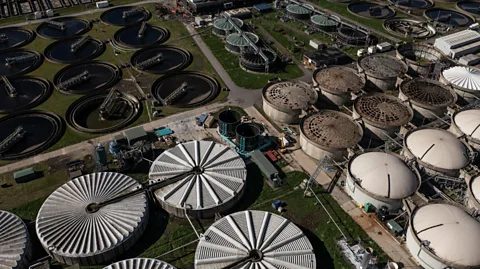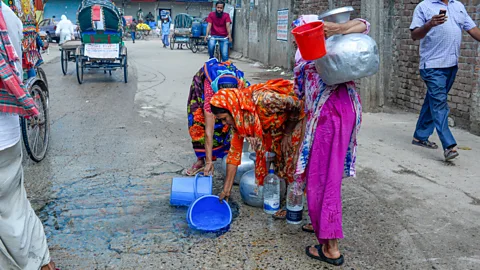Is filtered water healthier than tap water?
Table-top filters can remove contaminants from tap water – but are they really necessary, and could they cause unintentional harm?
If she can help it, Shima Chin-See avoids drinking water straight from the tap. Her refrigerator at home in Northwich, UK, where she lives with her young family, comes with an in-door water dispenser that’s linked to a filter. And when she’s out and about, she keeps her trusty self-cleaning bottle handy – one that sterilises water via an ultraviolet chip embedded in its cap.
"Filtered water just tastes better," says Chin-See. "I can smell the chemicals in tap water and taste them too."
Some people find her odd for saying that – including her husband who once performed a blind taste test on her (it turns out she could tell the difference between filtered and unfiltered tap water). But as it turns out, Chin-See is far from alone in her thinking. When the non-profit Environmental Working Group polled 2,800 people living across the US, half said their tap water was unsafe to drink, with nearly 35% filtering their water.
Similarly, according to a 2023 survey of more than 500 people in the UK by the Swedish filter company Tappwater, 42% "don’t trust or like the taste of tap water". A quarter of respondents believed their tap water wasn’t clean, with contaminants, chemicals, and bacteria their top concerns. As a result, more than half of Londoners (54%) said they use a water filter.
Water filters, it seems, are having a heyday – particularly in North America, Europe, and China. In 2022, the global water purifier market was worth an estimated $30bn (£24bn); and it’s expected to grow more than 7% by 2030.
Proponents argue that filtering water can bring about numerous benefits, from removing toxins and pathogens to reducing hardness and improving odour and taste. But is filtered water really healthier for you than water from the tap?
Running the gamut
For those who prefer to filter their water, there’s a smorgasbord of systems to choose from: pitcher-style filters, tap-mounted ones, countertop or refrigerator purifiers, and under-sink setups, to name just a few. Simple ones cost only a couple of dollars, while more elaborate devices – think wi-fi-enabled gadgets that track water usage and detect plumbing problems – can run to four figures.
In general, water filters fall into two main groups, says Kyle Postmus, who oversees filter certification at the National Sanitation Foundation (NSF), an independent certification organisation in Michigan, US. "Point-of-use ones filter water just before it goes into a glass, while point-of-entry filters treat water at the point where it enters a house or building," says Postmus.
Filters also differ in the type of materials they’re made from and employ varying technologies – adsorption, ion exchange, reverse osmosis, and mechanical separation are the more popular ones – to weed out water from other molecules.
"Different filters can serve different treatment goals," says Detlef Knappe, a professor of civil, construction, and environmental engineering at North Carolina State University. "There’s a lot of nuances."
The trick is to understand what’s in your water and whether it needs to be treated, then find the appropriate filter to do so.
A last line of defence
Of course, the potential benefits of filtering tap water depend on where in the world you live.
In developing countries where communities struggle to gain access to clean drinking water, "the primary problem we’re worried about is usually bacteria like E.coli and Legionella," says Brent Krueger, a chemistry professor and co-director of the Global Water Research Institute at Michigan’s Hope College. Contaminated water can cause diarrhoea, a preventable disease that kills an estimated one million people annually, nearly half of them children under five.
Water filters, however, can be "very effective at stopping bacteria," says Krueger, whose team has led such efforts in Latin America. In one trial, they installed filters in homes across 16 villages in the Dominican Republic. This led to the incidence of diarrhoea falling from 25.6% to under 10%, resulting in other positive knock-on effects. "Children miss less school, and adults miss less work which provides a financial benefit to the family as well," says Krueger.
 Getty Images
Getty Images
In Western countries, the water that comes out of the tap has already been extensively filtered to remove harmful contaminants – but some slip through (Credit: Getty Images)
In the Western world, tap water is tightly regulated and generally considered safe. The US, for instance, has legislation requiring suppliers to uphold certain water quality standards and to treat more than 90 contaminants that may be found in public drinking water.
In the UK, water undergoes multiple filtration rounds followed by ultraviolet disinfection and chlorination before reaching consumers’ taps. The country was ranked joint first for drinking water quality and sanitation in Yale University’s 2022 Environmental Performance Index, a biennial assessment of global sustainability, along with Finland, Iceland, Norway, Switzerland, and the Netherlands.
"In most of these [Western] countries, the water provider is required to do regular testing and make the information public," says Krueger.
However, Krueger caveats: "Just because you have a big municipal water system doesn’t mean that everything is definitely fine."
Regulations may dictate the amount of lead permitted in pipes, but this doesn’t always extend to those in residential properties – which can be problematic, particularly in older houses. "Rusty pipes are a big problem. I see a lot of lead toxicity from old water pipes," says Nirusa Kumaran, a doctor in London and the medical director of the wellness centre HUM2N.
In these instances, filters may be helpful for removing lead from water. Additionally, Kumaran says they can provide a last line of defence against other toxins and chemicals present. "We see remnants of certain medications – hormone replacement therapy, the contraceptive pill, certain psychotropic medications – still within our water system. They come from urine, so when you’re peeing out medication, they get into the river," she explains.
Stopping forever chemicals
One toxin in tap water that is concerning some experts is a group of more than 15,000 man-made chemicals called PFAS, which stands for per- and polyfluoroalkyl substances. Also called "forever chemicals" because they persist in the environment without degrading, PFAS are linked to a host of health issues, including cancer, liver damage, and reduced fertility. (Read more about whether it is possible to take the "forever" out of "forever chemicals" in this article by Anna Turns.)
 Getty Images
Getty Images
Water filters are particularly beneficial in parts of the world where drinking water may contain harmful bacteria or parasites (Credit: Getty Images)
"We worry about very low levels of the chemicals because certain PFAS can bioaccumulate in the human body in a pretty dramatic way," says Knappe. "There’s low levels of PFAS in almost all water supplies around the globe now."
For instance, at least one PFAS was detected in drinking water samples taken from 17 of England’s 18 water companies in 2023. In the US, PFAS is present in 45% of tap water, with six in every 10 people believed to be exposed to the chemicals.
Thankfully, filters can help remove these harmful chemicals. In a paper published in 2020, Knappe and his fellow researchers discovered that reverse osmosis and two-stage filters that are installed under sinks (which have mechanical and activated carbon filters), are capable of removing nearly all the PFAS they evaluated.
Postmus, whose organisation provides accreditation for a range of products including water filters, recommends three types of water filter in particular: activated carbon, ion exchange, and reverse osmosis. "We’ve been certifying filters to reduce PFAS for nearly six years now, and we have data to demonstrate that they’re effective," he says.
Buyer beware
Although filters can be helpful in removing harmful chemicals from our water, they sometimes strip away beneficial minerals too. These include magnesium and calcium, as well as iron and manganese, which are eliminated to make water softer and prevent discolouration, respectively. Filters can also remove fluoride, which some municipalities add to tap water to help combat tooth decay.









